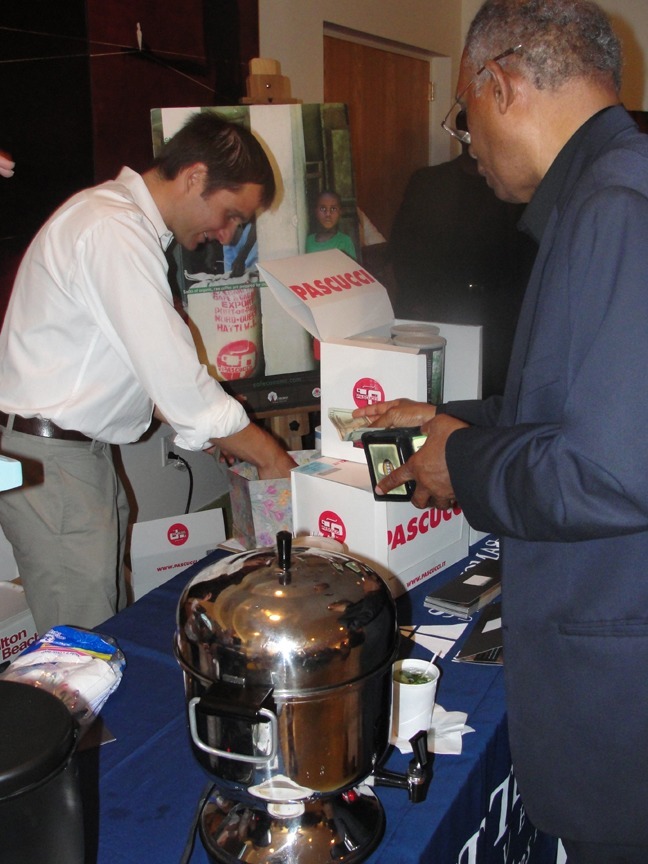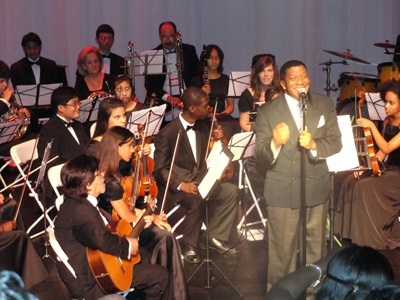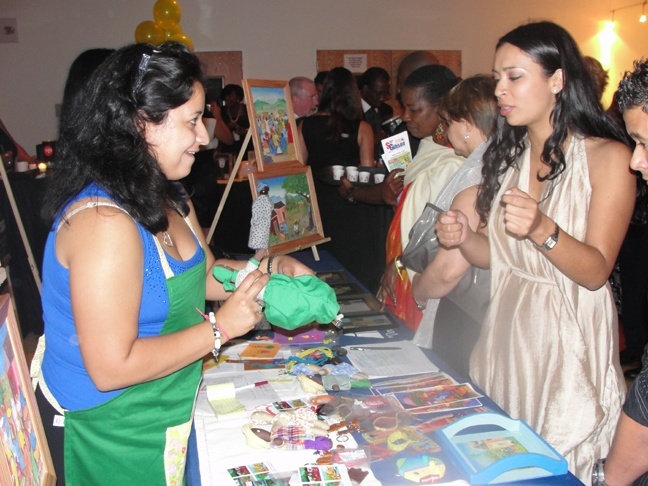By Melody Regalado - Florida Catholic correspondent

Photographer: MELODY REGALADO | FC
Anthony Vinciguerra, coordinator of St. Thomas University's Center for Justice and Peace, sells fair-trade coffee produced by a farmers cooperative in northwest Haiti.
LITTLE HAITI � A love for the betterment of Haiti brought 400 people to share a night of music, coffee and the arts, while raising awareness of �seeds of hope� being planted across the island.
The occasion was the red carpet premiere April 24 of the film, �Blooming Hope: Harvesting Smiles in Port-de-Paix,� held at the Little Haiti Cultural Center.
The film captures both the hardship and beauty of Haiti and portrays the lives of the people being empowered by the Global Solidarity Committee, a partnership between St. Thomas University, Amor en Acci�n and Catholic Relief Services.

Photographer: MELODY REGALADO | FC
Fresnel Larosiliere sings �To Haiti You Should Go� with Raul Rosero Polo and the South Florida Youth Symphony.
��Blooming Hope� was no accident,� said Tiffany Norman, a St. Thomas student who co-produced the film and served as emcee for the night. �On Jan. 12, it became very clear what the purpose of these projects was.�
Marcela Moyano-Rosero, a communications professor at St. Thomas, said she was transformed when she traveled to Haiti in May 2008.
�There was so much poverty, there was so much suffering,� said Moyano-Rosero, �but there was always hope.�
�People were always smiling and that captured my spirit,� she added. �We had to let people know what was happening there.�
She and her husband, Fernando Rosero, produced and directed the film along with five students from the university.
Their goal for the night and the film was to raise awareness about the projects and the situation in Haiti. Judging from the attendance and the money raised, they accomplished their goal.
All 280 seats of the auditorium were filled. Additional chairs had to be brought in and still some attendees stood in the aisles while others had to wait outside.
At a cocktail reception held after the screening, people darted straight to sampling and buying the coffee and admiring and purchasing the artwork. Organizers sold $900 worth of coffee, $350 in artisan work and raised about $500 in donations.
�Once you see this film, you�re transformed and can�t ignore it,� said Norman.
Ralph Latortue, Haiti�s general consul in Miami, spoke of the aftermath of the recent earthquake and the different resources and professions that can benefit the country.
�This is why Haiti needs sustainable short- and long-term assistance,� he said. �We need to get people in Haiti back to making a living.�
The South Florida Youth Symphony kicked off the night with the music that accompanies the film. The symphony, under the direction of Margorie Hahn and Richard Yaklich, teaches students from the age of five to their college years the art of classical music.
�It was pure luck to find a children�s orchestra formed 80 percent by Haitians,� said Raul Rosero Polo, Moyano-Rosero�s father-in-law, who directed most of the music. �I read and studied a lot before writing the music and I did it with love.�
A Spanish version of �Haiti� was performed by his wife, Aura Rosero, and an English version by Evelyne Baille, a Haitian singer. Fresnel Larosiliere sang, �To Haiti You Should Go,� and Kazak International performed �Jacmel.�
�The key of hope and everything is love,� said Juan Rosero-Marta before singing �Time to Change,� a song he wrote and composed for the film as a tribute to Haiti.
The documentary tells the story of Tata Dumaise who was a restavec, or a child forced into servitude. She wanted a better life for her children, and she�s accomplishing this through her work with the Women�s Free Trade Artisan Initiative, using natural resources to make pieces of art to sell around the world.
It also shows how nearly 300 children from a school in Baie-de-Henne are benefitting from an education as well as a daily meal thanks to a solar oven donated by Miami-Dade County Commissioner Barbara Jordan.
Northwestern Haiti is an area greatly affected by deforestation and a lack of electricity.
The film also depicts Elicoeur Beaubrun, a local coffee farmer from Ma-Wouj, who explains the significance of the COCANO Fair-Trade Coffee Cooperative.
�There is a need to give a lot of economic freedom to people so local entrepreneurs can flourish,� said Manoj Mathew, associate director of programs at the Centre for Civil Society who was visiting from India.
Anthony Vinciguerra, coordinator of the Center for Justice and Peace at St. Thomas University, said these projects were chosen because they come directly from the community and are run by its members, address long-term issues, and benefit all those involved.
Members and volunteers with the Global Solidarity Committee began taking trips to Haiti in late 2006 and go back three times a year. They took their time understanding the Haitians� situation, experienced the difficulties of life there and asked what they could do to collaborate.
�When you�re watching the pain and suffering of your people, it touches your heart,� said Father Reginald Jean-Mary, pastor of Notre Dame d'Haiti Mission in Miami. He comes from the northwest, and part of the documentary was filmed in his home town of Jean-Rabel.
�The documentary, to me, is a call to our conscience,� Father Jean-Mary told those gathered for the screening. �I will continue to encourage you to help Haiti, to be a voice for the voiceless, and to be mostly a presence of hope for those who are hopeless.�

Photographer: MELODY REGALADO | FC
Vanessa Sanchez shows off one of the handmade crafts made by a women's cooperative in Haiti.


Comments from readers
Thank you and God Bless!